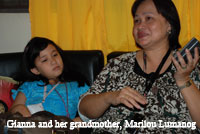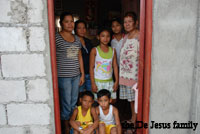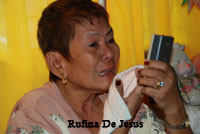(Manila, January 7, 2009) Nearly thirteen years after the Abadilla Five’s arrest and subsequent detention in June 1996, their families, the wives, children, mother and a grandmother, have yet to get over with their feeling of tremendous loss.
 One of these, Marilou Lumanog (54), wife of Lenido Lumanog, shares with other fellow relatives of the prisoners when she was interviewed on January 6, about deliberately keeping her pain and suffering away from the notice of her children. All these years, she never cried nor let her children see her suffering right up until she revealed her emotions the other day.
One of these, Marilou Lumanog (54), wife of Lenido Lumanog, shares with other fellow relatives of the prisoners when she was interviewed on January 6, about deliberately keeping her pain and suffering away from the notice of her children. All these years, she never cried nor let her children see her suffering right up until she revealed her emotions the other day.
“I don’t have anybody to cry to, ngayon lang (only now). Hindi nila ako nakikitang umiiyak kasi ayaw kung makita ako ng mga anak ko na mahina ako (I never let my children see my crying. I don’t want them to see me cry),” was Marilou’s reply when asked why it is so.
The Lumanogs lost their numerous properties and business which Lenido used to managed prior to his arrest and detention. The cost of legal expenditures during the first few years of his detention forced their family to let go of their business. They, too, had to spend thousands of pesos for food, transportation and other expenses for wanting to visit Lenido in jail on a daily basis.
 Marilou’s children, namely Lucky, 24; Lian, Leigh, Lou and Pogs, who were then studying at exclusive schools prior to their father’s arrest and detention, had to be transferred to another school because they could no longer afford the fees. The children, too, suffered tremendous humiliation after being labeled as children of a murderer. One of her children, Lian, had to stop schooling altogether as she could no longer bear being humiliated.
Marilou’s children, namely Lucky, 24; Lian, Leigh, Lou and Pogs, who were then studying at exclusive schools prior to their father’s arrest and detention, had to be transferred to another school because they could no longer afford the fees. The children, too, suffered tremendous humiliation after being labeled as children of a murderer. One of her children, Lian, had to stop schooling altogether as she could no longer bear being humiliated.
The Lumanogs, too, in early 2000s were left with no choice but to live in slum areas for two years after losing their house. They could also not afford to pay rent. It was an extremely tremendous struggle for Marilou and her children, who are actually not used to that way of life. However, later they had gradually accepted the realities of what they are into now. Her children too had to work to help their family support their basic needs.
Like Marilou’s recollection of her family’s life with Lenido, Cherelyn De Jesus, wife of another detainee Joel De Jesus, shares how good a provider Joel was as a husband. Though he only earns a living by driving a passenger motorcycle, Cherelyn need not to accept laundry and worry about finding sources of living and what food to eat for the day, which she now does after Joel’s arrest. She, too, had to raise their daughter, Jorelyn and son Darrel, all by herself.
 Jorelyn, now 14 years old and a junior High School student at the North Fairview High School in Quezon City, grew up knowing her father as a prisoner. When her father was arbitrarily arrested, her mother had to carry her wherever she goes as they struggled to locate her husband to possible places where they thought he wass held, in police stations, detention centers and even morgues. Since Jorelyn was two years old, her father’s hopes and dreams for their family is to be a free man before she completes high school, at least.
Jorelyn, now 14 years old and a junior High School student at the North Fairview High School in Quezon City, grew up knowing her father as a prisoner. When her father was arbitrarily arrested, her mother had to carry her wherever she goes as they struggled to locate her husband to possible places where they thought he wass held, in police stations, detention centers and even morgues. Since Jorelyn was two years old, her father’s hopes and dreams for their family is to be a free man before she completes high school, at least.
However, unless the Supreme Court (SC) takes prompt action for the Abadilla Five’s Petition for Review on Certiorari calling to have the lower court’s decision convicting them for the June 1996 murder of Rolando Abadilla null and void, Joel’s hope is dim. The SC, according to the Rules of Court, should be able to conclude the case in at least one year. However, the detainee’s previous experiences have already shown they are unable to do so.
 Joel’s mother, Rufina, could not help from crying as she recalls how her son had suffered while in police custody. She recalled seeing him visibly badly wounded and frightened telling her how he feared for his safety while in custody. When her son was presented before the media as suspects to Abadilla’s murder and accused him of the possession of a firearm, she was in disbelief and nearly lost her consciousness.
Joel’s mother, Rufina, could not help from crying as she recalls how her son had suffered while in police custody. She recalled seeing him visibly badly wounded and frightened telling her how he feared for his safety while in custody. When her son was presented before the media as suspects to Abadilla’s murder and accused him of the possession of a firearm, she was in disbelief and nearly lost her consciousness.
She, too, never thought that it would be Joel that the media were waiting to presented in public. She was later to find him inside the Philippine National Police’s (PNP) headquarter in Camp Rafael Crame in Quezon City.
Like Joel, the police had to stick Lenido’s hair with glue to his forehead purposely to cover the injuries he had suffered due to police beating. Until now, Lenido’s scars on his forehead remains visible nearly 13 years after the incident happened. However, the complaint they filed for violation of their rights to which the Commission on Human Rights (CHR) had also recommended to be filed in court was never filed in court and never seen any progress.
No charges have been filed against the policemen involved. Some of the respondents have already been able to retire from service while other have died.
Rufina, until now, could not believe the allegations that her son as a murder suspect. She said it is unlikely for her son to be involved in Abadilla’s murder since he himself is even scared of seeing firearms. Joel too had never been involved in any trouble nor had known enemies. When the policemen had him arrested, he refused their demands for him to point persons they insist were his accomplices. Joel stood for himself and preferred to suffer in jail by himself than pointing other innocent persons like him as suspects.
For Augusto Santos’ grandmother part, 66-year-old Lolita San Felipe, thirteen years on like other relatives she had yet to get over from what had happened to her grandson. Augusto, who is the son of Lolita’s daughter, grew up knowing her as both his mother and father. Augusto has since been neglected by his parents and left to Lolita’s care. Unlike his mother, Lolita refused to come to terms that his grandson was involved in murdering Abadilla.
Since Augusto was in jail, his 11-year-old son Axel was also left to Lolita’s custody. Like the other children of the Abadilla Five — Joel’s Jorelyn, 14; Daniel, 10; and Darrel, 16; and Lenido’s eight-year-old grandchild, Gianna — Axel had grown up knowing his father as a prisoner. He had to study at the elementary school in Camp Crame where his father was detained, only to be close to him.
Augusto’s detention also leaves more responsibility to take care of his son to Lolita, which was the latter did to him after he was abandoned by his parents. Apart from experiencing difficulties of providing Axel’s needs for schooling, clothing and food, she too had to struggle saving money to be able to visit Augusto in jail. She said they had to at least have Php 1,000 before they could visit him at the jail to pay for transportation and basic needs for Augusto.
The Abadilla Five’s detention is not only costly to theirs, but also of their families lives.